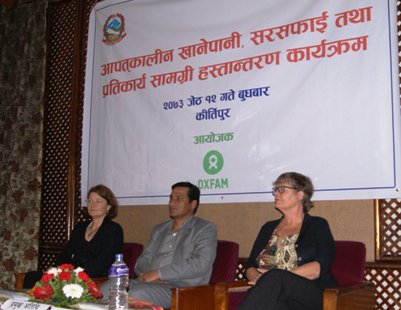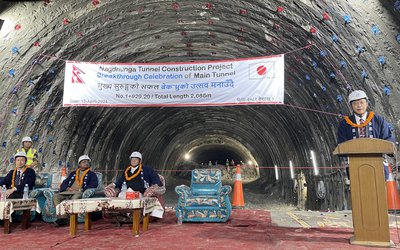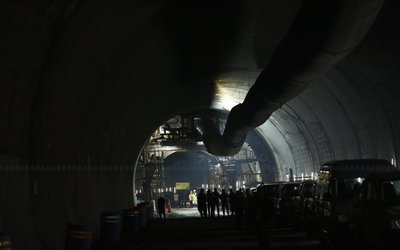
As a highly vulnerable country in terms of natural disasters, Nepal may face major disasters any time any day. Better preparedness is the best way to prevent casualty and loss of property.
Nepal is one of the disaster prone countries in the world, ranking 11th in earthquake vulnerability, 30th in flood and 4th in climate change impact, which are causing deaths, injuries and displacements to hundreds and thousands of people.
Working in natural disasters and climate change for quite a long time, Oxfam International, an INGO, knows what needs to be done for the future. In its efforts to make Nepal better prepared for future disasters, Oxfam has recently handed over Emergency Stockpile Materials and Water Facility System to four different organizations.
Home Minister Shakti Kumar Basnet attended the ceremony as the chief guest during the handover of emergency water facilities in Kirtipur, Khumaltar, and Daikhu.
Minister Basnet, Head of DFID Nepal Dr. Gail Marzetti and country director of Oxfam Nepal Cecilia Keizer handed over stock pile and water facilities installed in the premises of Tribhuvan University, Kirtipur, NARC and Deikhu to Lumanti and ENPHO. According to a press release issued by Oxfam, the emergency water facilities in Kirtipur, Khumaltar and Daikhu were handed over to TU, NARC and Kathmandu Upathaka Khanepani Limited (KUKL) respectively.
Oxfam in Nepal with financial support from DFID has implemented two large scale projects namely Urban WASH Preparedness and Community Based Disaster Risk Reduction Projects in Kathmandu Valley and in Western Terai Municipalities since April 2012.
The amount of goods handed over to TU is 17. 6 million rupees, and 27. 6 milion rupees went to Lumanti. The goods for NARC are worth 14. 5 million rupees, the goods handed over to ENPHO are over 15 million rupees and goods handed over to KUKL are over 6.6 million rupees.
For the last one hand and a half decade, Oxfam Nepal, which has been responding to disasters, dispatched the necessary stock piles in Khumaltar and Kirtipur in the earthquake affected places to support people instantly after April 25 earthquake.
The emergency water facilities installed in Kirtipur and Khumaltar were significantly used serving people with clean drinking water for at least four months after disaster. The preparedness through these stockpiles and emergency water proved to be successful in responding to the Earthquake 2015.
The projects aim at strengthening emergency response capacity among most vulnerable communities to floods and earthquakes. Both projects were successfully accomplished producing good results and impacts in terms of applying knowledge and skills while responding to the 2014 flooding in Kailali District and April 2015 Earthquake Response in Kathmandu Valley and nearby districts.
“As a part of emergency preparedness, Urban WASH project has installed seismic resistant emergency water facilities and stockpiled emergency WASH materials in the premises of Tribhuvan University (TU) in Kirtipur and Nepal Agriculture and Research Council (NARC) in Satdobato for emergency humanitarian response as recommended by the Government of Nepal,” stated the press release issued by Oxfam.
Oxfam in Nepal was executing Disaster Risk Reduction (DRR) program in different districts of Nepal to prepare the nation to respond to possible disasters. OXFAM with funding support from UK Government (UKAid), was implementing Urban Risk Management Project in Kathmandu Valley since 2012 focusing its emergency WASH preparedness works in two Open Spaces (Kirtipur in Kathmandu and Khumaltar in Lalitpur) with Emergency stockpiles and emergency water facilities, out of 83 open spaces endorsed by the Ministry of Home Affairs when a mega earthquake rattled Nepal.
However, Nepal is still a disaster prone zone. Many districts are still highly vulnerable to floods and landslides and the nation is always prone to earthquake at anytime. Hence, it is important that every unit of nation working on DRR be strengthened in preparedness.
Oxfam in Nepal was executing Disaster Risk Reduction (DRR) program in different districts of Nepal to prepare the nation to respond possible disasters. OXFAM with funding support from UK Government (UKAid), was implementing Urban Risk Management Project in Kathmandu Valley since 2012 focusing its emergency WASH preparedness works in two Open Spaces (Kirtipur in Kathmandu and Khumaltar in Lalitpur) with Emergency stockpiles and emergency water facilities, out of 83 open spaces endorsed by the Ministry of Home Affairs when a mega earthquake rattled Nepal.
- TANAHU HYDROPOWER PROEJCT: A Significant Achievement
- Apr 15, 2024
- AMBASSADOR HANAN GODAR: Sharing Pain With A Nepali Family
- Mar 30, 2024
- VISIT OF KfW AND EIB TO NEPAL : Mission Matters
- Mar 25, 2024
- NEPAL BRITAIN SOCIETY: Pratima Pande's Leadership
- Mar 24, 2024
- NEPAL ARMY DAY: Time To Recall Glory
- Mar 15, 2024
















